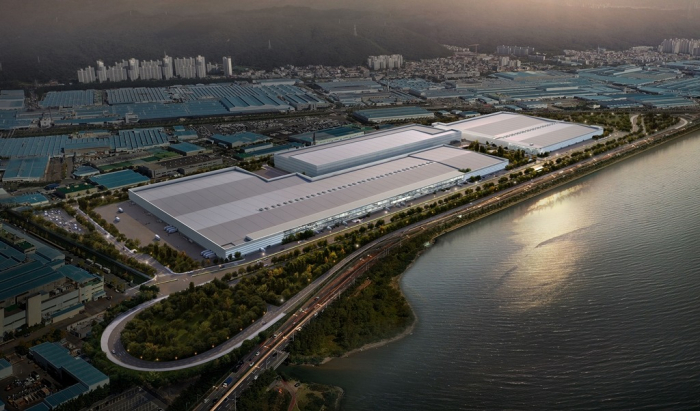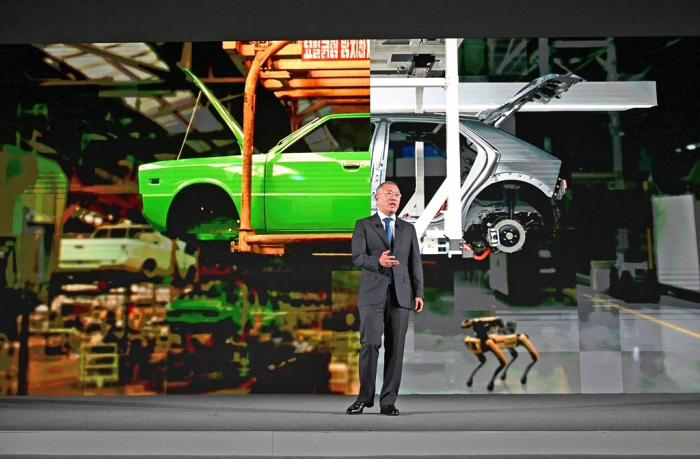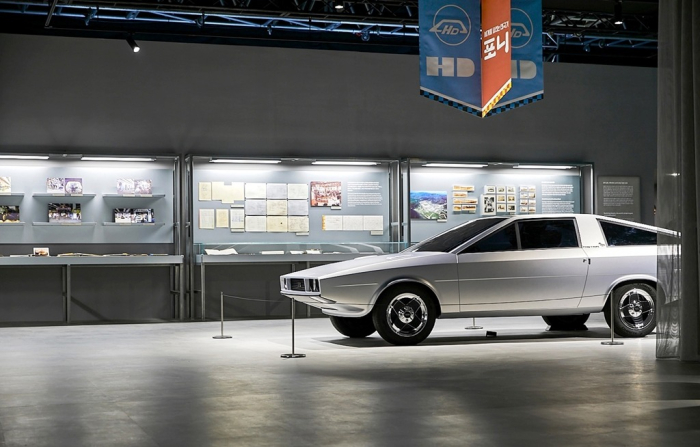Electric vehicles
Hyundai breaks ground on $1.5 bn EV plant in S.Korea
A large electrified Genesis SUV built on new platform, which increases EV mileage by 50%, will be the new plant's first model
By Nov 13, 2023 (Gmt+09:00)
4
Min read
Most Read
LG Chem to sell water filter business to Glenwood PE for $692 million


KT&G eyes overseas M&A after rejecting activist fund's offer


Kyobo Life poised to buy Japan’s SBI Group-owned savings bank


StockX in merger talks with Naver’s online reseller Kream


Meritz backs half of ex-manager’s $210 mn hedge fund



ULSAN -- Hyundai Motor Co., the world’s third-largest automaker along with its affiliate Kia Corp., on Monday broke ground for a dedicated electric vehicle factory in South Korea in its push to lead the global future mobility industry.
Hyundai, the country’s top carmaker, is scheduled to complete the construction of the plant with an annual capacity of 200,000 EVs in 2025 with an investment of 2 trillion won ($1.5 billion) for mass production from the first quarter of 2026.
A large electrified sport utility vehicle of Hyundai’s luxury brand Genesis will be the first model from the plant to be built on a site of 548,000 square meters (6 million square feet) in Ulsan where the company started assembling cars. The electric SUV is the first EV built on Hyundai Motor Group’s new dedicated EV platform eM, which increases mileage by 50%.
“The dedicated EV plant marks another beginning toward the era of electrification for the next 50 years,” said Hyundai Motor Group Chairman Chung Euisun in a speech at the groundbreaking ceremony. “I am honored to share the dream of a company for a hundred years here.”
The factory in the metropolitan city about 300 kilometers (186 miles) southeast of Seoul will be Hyundai’s first new domestic plant in 29 years since it built a facility in Asan in 1996.
CONTINUOUS INVESTMENT WITH FLEXIBILITY
Hyundai plans to continue the investments in electrification with flexibility in line with the speed of the growth in the EV sector as demand for the clean vehicles is expected to keep expanding, Chung said.
“EV demand will grow in the big picture anyway, so we will work flexibly although there are many ways [to deal with it] such as cost cuts,” Chung told reporters after the ceremony when asked about the group’s investments amid the slowdown in the eco-friendly vehicle sector.

The remarks indicated the group plans to keep investing in the EV sector for the mid to long term while adjusting the speed and size of the spending in the near term, industry sources said.
Hyundai aims to sell 2 million EVs by 2030 from an estimated 33,000 units of the clean vehicles this year and 94,000 units in 2026.
Hyundai’s affiliate Kia in April broke ground on its first electric purpose-built vehicle plant in South Korea with a plan for mass production in the second half of 2025. The two new EV facilities will boost Hyundai Motor Group’s EV production capacity in the country by 350,000 units a year.
The group aims to manufacture 15.1 million EVs in the country by 2030, about 41% of its global production target of 36.4 million units, by utilizing local supply chains for key components such as batteries and motors.
FLEXIBLE PRODUCTION SYSTEM
The maker of the IONIQ EV series plans to introduce a flexible production system to deal with changes in global trends and manufacture various models in the new plant with automated assembly facilities to improve productivity and quality.
Hyundai is set to apply robotics, artificial intelligence and smart logistics systems to make the new plant a safe and effective facility with accurate workmanship.
“We believe Hyundai will stand tall as a powerhouse in the EV era with the decisive investment,” said Jang Youngjin, Vice Minister of Trade, Industry and Energy, during the ceremony.
“The government will also support to improve the corporate investment environment through bold tax incentives and others.”
ULSAN, BIRTHPLACE OF HYUNDAI MOTOR
Hyundai opened a car assembly plant in 1968 in Ulsan with the goal of introducing South Korean automobiles to the global market.
The maker of the Santa Fe SUV started mass production of its first model – the Pony – in 1975, leading the development of South Korean auto technology, which had heavily relied on foreign carmakers.
Hyundai plans to build the new EV factory on the proving ground of the Ulsan complex, which has been used to develop vehicles for overseas markets that can withstand various topography and harsh climates since the 1980s.
The company tested steady-selling popular models in the global market such as the Sonata midsize sedan and the Elantra compact car there.
It also used the facility for the development of its first EV prototype Sonata EV in 1991 while succeeding in the test drive of its first driverless vehicle the following year on the same grounds.

“Hyundai will continue to make efforts to create innovative mobility for people by inheriting the heritage of the Ulsan plant, which made a great dream a reality with human power,” said Hyundai CEO Chang Jae-hoon.
(Updated with Kia’s new PBV plant, Hyundai Motor Group EV output target)
Write to Sungsu Bae at baebae@hankyung.com
Jongwoo Cheon edited this article.
More to Read
-
 Electric vehiclesHyundai Motor Way: New strategy to accelerate EV push
Electric vehiclesHyundai Motor Way: New strategy to accelerate EV pushJun 20, 2023 (Gmt+09:00)
4 Min read -
 AutomobilesHyundai's journey from the Pony to world's No.3 carmaker
AutomobilesHyundai's journey from the Pony to world's No.3 carmakerJun 08, 2023 (Gmt+09:00)
1 Min read -
 Electric vehiclesHyundai Motor to build 1st Korea plant in 29 years
Electric vehiclesHyundai Motor to build 1st Korea plant in 29 yearsJul 12, 2022 (Gmt+09:00)
4 Min read
Comment 0
LOG IN


